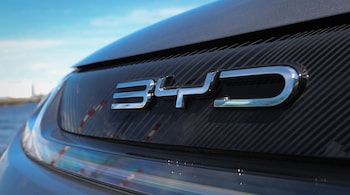BYD Co is on the cusp of overtaking Tesla Inc as the world’s biggest electric-vehicle maker, spurring analysts and investors to show renewed enthusiasm for the company. Yet one of its biggest backers wasn’t entirely convinced that a move from the mobile-phone sector into autos was a smart idea, and suggested founder Wang Chuan-fu think it through.
Berkshire Hathaway Inc bought around 10 percent of Shenzhen-based BYD in September 2008 for $230 million, betting in large part on Wang’s engineering skills. At the time, BYD was best known for making handset components including their rechargeable batteries, but Berkshire leaders Warren Buffett and Charlie Munger saw the investment as a chance to tap into rising global demand for environmentally friendly technology. Wang had bought struggling state-backed Qinchuan Automobile Co in 2002.
“Both BYD and we tried to talk about ‘are we going into the car business?’ They're gonna buy a bankrupt car business and go into the car business,” Munger said in an interview with the Acquired podcast published Oct. 29. “I said, ‘That's a graveyard for you and also, why would you wanna do that?’ And he paid no attention to us and went right ahead.”
Soon after its 2008 investment, Berkshire took a seat on BYD’s board. Buffett and Munger have since ridden the stock through an unprecedented renaissance in the global car industry as consumers care less about engine size and more about the environment. That initial stake, which Berkshire saw as more akin to a venture-capital investment, is now worth over $9 billion, though the Omaha, Nebraska-based company has recently trimmed its holdings.
But, according to Munger, BYD almost went broke as the company expanded its dealership network long before demand for new-energy vehicles arrived. Time and again, it was the technical chops and focus of Wang — now 57 — that won Berkshire over. “That guy was a genius,” Munger recalled in the podcast. “I’ve never seen anybody like that, he could do anything. He was a natural engineer and get-it-done type production executive."
It’s hard not to draw parallels with the brash South African who took over Tesla and helped ignite global interest in EVs. Earlier this year, Munger noted that Elon Musk, 52, probably overestimates himself, but such a quality is more a strength than weakness. “He would not have achieved what he has in life if he hadn't tried for unreasonably extreme objectives,” said the Berkshire vice chairman, who turns 100 on Jan. 1.
That two men of similar age and with no real background in automotive engineering could turn the global car market upside down says a lot about what’s needed to reinvent a product that has changed little in 100 years. At the heart of both companies is a focus on batteries. Neither is a pioneer or inventor of core battery technology, but their entry and joint ventures have spurred greater investment in research.
BYD-made batteries currently command just 16 percent of the EV market, with more than 90 percent of production going to its own cars. But a planned boost in capacity means it’s well-placed to increase shipments to external clients such as Tesla, according to Bloomberg Intelligence analyst Joanna Chen. Development of a new, thinner product called blade batteries, coupled with rising production of low-cost lithium iron phosphate alternatives, means BYD is likely to be a global EV leader in cars, and the batteries inside.
“Its blade-battery technology upgrade has bolstered surging car sales to make BYD the world's largest maker of battery-only and plug-in hybrid EVs, which in turn can promote the popularity and sales of its battery products,” Chen wrote this week. Its edge in cheaper, safer batteries could also help BYD land more orders, she wrote.
This two-pronged strategy has spurred sell-side analysts to raise their full-year net income estimates by 15 percent for this year and 18 percent for 2024 over the past four weeks, despite rising competition and an ongoing price war. Although Berkshire has continued to trim its stake, to 7.98 percent on Oct. 30, such a sell-down should be considered a reallocation of capital rather a vote against the stock.
Instead, we need to look at the bigger picture. It doesn’t matter if or when BYD overtakes Tesla in the EV market. That event will simply be a reminder that even amid the current turmoil, two new entrants breathed life into a graveyard industry.
Tim Culpan is a Bloomberg Opinion columnist. Views do not represent the stand of this publication.
Credit: Bloomberg
Discover the latest Business News, Sensex, and Nifty updates. Obtain Personal Finance insights, tax queries, and expert opinions on Moneycontrol or download the Moneycontrol App to stay updated!









